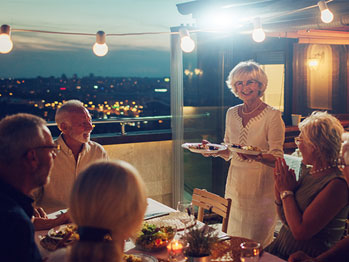
Though families have retreated into their homes, it seems that dads the world over are taking centre stage on social media and video sharing platforms – providing an antidote to COVID-19 anxiety.
Quarantined dads have showcased their skills at kitchen cupboard percussion to match Phil Collins’ famous drum solo, looked for things to fix, pretended to break the rules to order coffee at their local cafe, performed surgery on soft toys and mastered family TikTok dances. Especially the dances.
Though we might expect a more serious response from fathers to an upended world, humour, laughter and playfulness help foster resilience and provide a coping strategy to better manage and reduce stress.
Cultivating a laughter mindset is an important tool to build connection and gain some mastery over things we can’t control. Not all play or humour results in laughter, but it primes the mind’s internal landscape towards positivity. As Laughter Yoga founder Dr Madan Kataria puts it, “laughter doesn’t necessarily solve a problem but it helps dissolve it”.
Dads as role models
No matter what country we’re from, viewers are all laughing in the same language at TikTok videos.
Learning to laugh at yourself develops personal resilience, and that’s what children are perhaps seeing in their parents for the very first time. Self-enhancing humour – maintaining a humorous outlook in stressful or adverse situations – is linked to positive psychological well-being signs such as happiness, satisfaction with life, and an optimistic outlook.
So, if we can laugh at COVID-19 by making jokes about toilet paper or homeschooling it lessens the sting, making us feel more in control.
When dads (and mums) draw on humour, laughter and play, it teaches children there’s another way to respond to conflict and crisis. It helps provide a new perspective on challenging situations and, when initiated and modelled by adults, can be particularly effective in quelling anxiety.
Parents dancing around the living room, having fun, even being silly invoke a sense of ease. When we’re laughing and smiling the mind is anchored in a moment of positivity. Negativity in the shape of fear, depression or anxiety has no footing.
The family that boogies together …
With dads spending more time at home, the lines between their work life and home life are blurring, making way for daggy dad jokes and fish-out-of-water dad dance routines. Many families have taken on the challenge of learning a short Blinding Lights dance sequence set to a 2019 song by The Weeknd.
Familiar faces, such as late night television host Jimmy Fallon, are being shown onscreen in their role as fathers, highlighting the humour and absurdity that can come with working from home.
Some dads are using isolation as an excuse to show they can still throw down.
Family bonding
While physical distancing measures apply outside home, social isolation can also be occurring within them, with family members turning their attention to separate screens and potentially harbouring private fears and anxieties.
In family lockdown, how can we protect our children from the global and domestic anguish in the face of coronavirus infection and death? Laughing as a family creates stronger bonds and makes us feel part of the same team.
While experiencing stress with others helps us bond by cuing an oxytocin release in our brains, laughing provides an instant salve for anxious feelings by signalling the release of “feel good” neurotransmitters: dopamine, oxytocin, serotonin and endorphins.
Laughter doesn’t just lighten your load mentally – it induces a range of physiological, psychological, social, spiritual, and quality-of-life benefits for heart health, blood pressure in aged care settings, and pain tolerance. Laughter has a similar effect on the brain as meditation, anchoring our minds to a present moment of joy.
The apparent increase in entertaining dad content online shows families are reframing a stressful situation with a humour mindset. The more we train our humour muscle, the stronger our neural pathways towards positivity and humour. So in the future, we’ll have expanded our resources to respond to a stressful situation with more levity. ![]()











